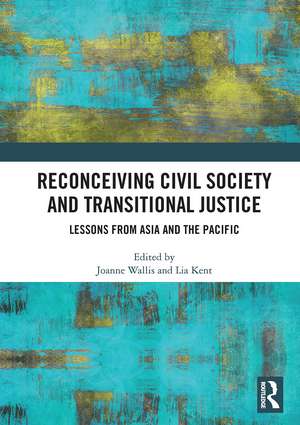Reconceiving Civil Society and Transitional Justice: Lessons from Asia and the Pacific
Editat de Joanne Wallis, Lia Kenten Limba Engleză Paperback – 24 iun 2024
Although civil society organisations play an integral role in the pursuit of transitional justice in conflict-affected societies, the literature lacks a comprehensive conceptualisation of the diversity and complexity of these roles. This reflects the degree to which dominant approaches to transitional justice focus on liberal-legal justice strategies and international human rights norms. In this context, civil society organisations are perceived as intermediaries who are thought to advocate for and support formal, liberal transitional justice processes. The contributions to this volume demonstrate that the reality is more complicated; civil society can – and does – play important roles in enabling formal transitional justice processes, but it can also disrupt them. Informed by detailed fieldwork across Asia and the Pacific Islands, the contributions demonstrate that neither transitional justice or civil society should be treated as taken-for-granted concepts.
Demonstrating that neither transitional justice or civil society should be treated as taken-for-granted concepts, Reconceiving Civil Society and Transitional Justice will be of great interest to scholars of Security Studies, Asian Studies, Peacebuilding, Asia Pacific, Human Rights, Reconciliation and the Politics of Memory. The chapters were originally published as a special issue of Global Change, Peace & Security.
| Toate formatele și edițiile | Preț | Express |
|---|---|---|
| Paperback (1) | 249.14 lei 6-8 săpt. | |
| Taylor & Francis – 24 iun 2024 | 249.14 lei 6-8 săpt. | |
| Hardback (1) | 1000.27 lei 6-8 săpt. | |
| Taylor & Francis – 7 apr 2020 | 1000.27 lei 6-8 săpt. |
Preț: 249.14 lei
Preț vechi: 324.14 lei
-23% Nou
Puncte Express: 374
Preț estimativ în valută:
47.67€ • 49.88$ • 39.60£
47.67€ • 49.88$ • 39.60£
Carte tipărită la comandă
Livrare economică 02-16 aprilie
Preluare comenzi: 021 569.72.76
Specificații
ISBN-13: 9781032839486
ISBN-10: 1032839481
Pagini: 124
Dimensiuni: 174 x 246 mm
Greutate: 0.23 kg
Ediția:1
Editura: Taylor & Francis
Colecția Routledge
Locul publicării:Oxford, United Kingdom
ISBN-10: 1032839481
Pagini: 124
Dimensiuni: 174 x 246 mm
Greutate: 0.23 kg
Ediția:1
Editura: Taylor & Francis
Colecția Routledge
Locul publicării:Oxford, United Kingdom
Public țintă
Postgraduate and Undergraduate CoreCuprins
Introduction: Special issue on ‘reconceiving civil society and transitional justice: lessons from Asia and the Pacific’ Joanne Wallis and Lia Kent 1. Reconciliations (Melanesian style) and transitional justice Volker Boege 2. The role of ‘uncivil’ society in transitional justice: evidence from Bougainville and Timor-Leste Joanne Wallis 3. Transitional justice and the spaces of memory activism in Timor-Leste and Aceh Lia Kent 4. From transitional to performative justice: peace activism in the aftermath of communal violence Birgit Bräuchler 5. Exploring the link between mine action and transitional justice in Cambodia Dahlia Simangan and Rebecca Gidley
Notă biografică
Joanne Wallis is an Associate Professor in the Coral Bell School of Asia Pacific Affairs in the College of Asia and the Pacific at the Australian National University. Her research focuses on peacebuilding and security in the Pacific Islands.
Lia Kent is a Visiting Fellow in the School of Regulation and Global Governance (RegNet) in the College of Asia and the Pacific at the Australian National University. Her research focuses on transitional justice and the politics of memory in Southeast Asia.
Lia Kent is a Visiting Fellow in the School of Regulation and Global Governance (RegNet) in the College of Asia and the Pacific at the Australian National University. Her research focuses on transitional justice and the politics of memory in Southeast Asia.
Descriere
Reconceiving Civil Society and Transitional Justice examines the role of civil society in transitional justice, exploring the forms of civil society that are enabled or disabled by transitional justice processes and the forms of transitional justice activity that are enabled and disabled by civil society actors.
